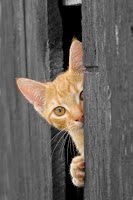See the fowls of the air: they sow not, neither do they reap
nor gather into barns; yet your heavenly Father feeds them. Are you not much
better than they?
(Mathhew 6:26)
Like one in water crying I thirst
(Hakuin; Chant in Praise ofZazen)
There’s a leak in the roof and a crack in the
foundation. You’re single and alone with
no money and two kids to feed. You have
no idea what you’re going to do. It’s a
disaster and you just want to die.
There are two things I’ve found helpful in these kinds of
situations.
The first is to expect that things will get worse before
they get better. I am not sure why this
is but, when you expect that things can’t possibly get any worse, they usually do. It’s a bit like when you’re in a heat wave and
the forecast keeps promising thunderstorms to break the oppressive humidity but
the rain never comes and the air just keeps getting heavier and heavier. As the days go by, you learn a precious
lesson. You learn that you can take the
heat.
The second thing I find helpful is to stop and ask: What is really lacking in this situation?
What is it I really want? Usually the
answer is an escape of some kind. When you
stop and ask this question, you stop running- from your problems, discomfort or
struggle, whatever it is- and relax. Even if only for a moment, you
are right there. You may not escape your problems
like this but you may find that you can be content, even amused, in the midst
of Life’s bottomless pit of opportunities.
They say that faith is an unconditional openness to what is, not a rational decision
based on fact or reason. But faith does
not fall from the sky either. You need to give
it room, to lift your eyes and glimpse into what is endlessly beyond each experience at any given moment. It is always right there.

